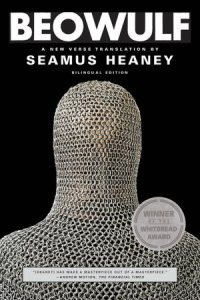
Beowulf, unknown, Seamus Heaney (translator). New York: W.W. Norton, 2000.
Summary: Seamus Heaney’s translation of this Old English poem, the heroic narrative of Beowulf’s confrontations with three deadly foes.
Long before the Lord of the Rings trilogy, there was Beowulf, thought to be written in the ninth century.
The tale is a familiar one in its basic narrative with Beowulf confronting three monstrous foes, Grendel, Grendel’s mother, and in old age after a long reign over the Geats, a dragon, who he also defeats, but at the price of being mortally wounded.
There are several things that impress me about the story itself. Young Beowulf is a man on a heroic journey upward. He volunteers to be sent by his king, Hygelac, to relieve the Danes of the terror of Grendel. While pious and acknowledging that his life is in God’s hands, he also strikes one as quite assured of his own powers, so much so that he will fight Grendel weaponless. He succeeds in wrenching Grendel’s arm from his shoulder, mortally wounded him arousing the avenging wrath of Grendel’s mother. After she kills one of the Danes, he goes to fight her in her watery abode, barely defeating her when his by a sword in her armory when his own sword fails him. He is celebrated twice over and rewarded with treasure. But he is also warned of the perils of power, by Hrothgar, the king of the Danes:
flower of warriors, beware of that trap.
Choose, dear Beowulf, the better part,
eternal rewards. do not give way to pride.
For a brief while your strength is in bloom
but it fades quickly; and soon there will follow
illness or the sword to lay you low,
or a sudden fire or surge of water
or jabbing blade or javelin from the air
or repellent age. Your piercing eye
will dim and darken; and death will arrive,
dear warrior, to sweep you away.
Beowulf returns to his king, and eventually succeeds him, and maintains the peace and safety of his people, providing a space of calm from the wars that raged around them. In his old age, he receives the report of a dragon awakened to rage by a theft from its horde, making depredations on his people. Once again he goes alone (a Christ figure?) deserted by his men,save Wiglaf his thane, this time the sacrificial hero for his people, on a journey downward to death, succeeding with the help of Wiglaf, in slaying the beast, while suffering a mortal wound.
And so the lesson of ephemeral power and life is realized. Throughout the narrative, we have flashbacks of other battles with Swedes and Danes, and the land of the Geats will lie at rest only a little longer, with Beowulf dead. But the poem ends with his funeral pyre, and his remains buried in a barrow with the dragon’s horde, seeing the wealth of gold as accursed.
What is also striking to me is the economy of words used to tell this story. Three heroic battles in just over 3000 lines. No long build-ups, no marathon descriptions of battles. Even the speeches seem brief and again and again one finds oneself saying, “that’s it?” while concluding that that was all that was needed.
Seamus Heaney’s translation, side by side with the Old English, conveys the lyricism and power of the original. His captures the form of the two balanced half lines with two stresses each of the poem and uses alliteration to convey these lyric qualities. Here, for example, his opening:
So, The Spear-Danes in days gone by
and the kings who ruled them had courage and greatness.
We have heard of those princes’ heroic campaigns.
The alliteration is never forced, the wording seems natural and the tale unfolds as the signal work that it is for English letters. If you’ve never read this poem, or suffered through a poor rendering of it, I would urge you to buy this edition.
Editor’s Note: Thank-you to Bob Trube for sharing his reviews with Emerging Scholars! Bob first posted the above review on Bob on Books. ~ Thomas B. Grosh IV, Associate Director, Emerging Scholars Network
Bob Trube is Associate Director of Faculty Ministry and Director of the Emerging Scholars Network. He blogs on books regularly at bobonbooks.com. He resides in Columbus, Ohio, with Marilyn and enjoys reading, gardening, choral singing, and plein air painting.

Leave a Reply